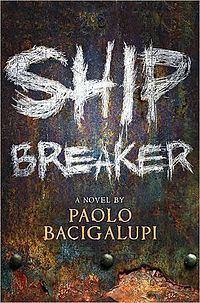Before I can so much as summarize
the plot of Ship Breaker, I feel that I should point you towards my
review of The Drowned Cities, the sequel/companion novel to Ship
Breaker. Since I am sure I’ll be making comparisons between the two, my
feelings towards The Drowned Cities may be helpful, though I hope this
review is coherent without that information.
To keep in the tradition that was
set with The Drowned Cities, I’ll allow the blurb to speak for itself: “In
America's Gulf Coast region, grounded oil tankers are being broken down for
parts, Nailer, a teenage boy, works the light crew, scavenging for copper
wiring just to make quota-and hopefully live to see another day. But when, by
luck or by chance, he discovers an exquisite clipper ship beached during a
recent hurricane, Nailer faces the most important decision of his life: Strip
the ship for all it's worth or rescue its lone survivor, a beautiful and
wealthy girl who could lead him to a better life....”
I can't talk about Ship Breaker until I get something out of the way; Ship Breaker is a good book. I haven’t run into anyone
saying otherwise. However, I fear that I may come across as not liking it.
That’s not true. It’s just that I loved The Drowned Cities so much that
I was disappointed by Ship Breaker in some aspects. Just remember that
as I ramble on.
Setting is so important for me and is vital to a book. Without setting,
characters just become little puppets dancing around on an empty stage. And Ship
Breaker has a good setting; the destroyed beaches of the Gulf with the
monolithic metal skeletons of the past creating an atmosphere of powerlessness.
On a simply superficial level it’s striking, but the real advantage with the
setting is the voice it lends to the global warming discussion that’s threaded
very openly throughout the book.
In fact, the global warming almost becomes preachy at points. When the
characters pass through New Orleans, now a deserted and submerged city, there’s
a discussion on how stupid the previous inhabitants were. How couldn’t they
have seen it coming? I have no problems with fiction trying to send a message,
or science-fiction stories that lean more towards the side of “science” than
“fiction.” Actually, stories that do fall into this category are immensely
important, but I think that such blatant messages turn some people off.
While the setting was interesting, the characters failed to interest me. (Get
ready for a comparison to The Drowned Cities.) Mahlia, Mouse, and Ocho were
characters that I loved in The Drowned Cities, Nailer and Nita failed to
interest me at all though. This is all the more perplexing because everything
I’ve seen on Ship Breaker has praised the characters. In the entire
book, precisely two characters inspired any sort of intrigue for me; Richard
Lopez, Nailer’s devil of a father who’s constantly hopped up on cheap booze and
drugs, and Tool, the same half-man that was (will be) in The Drowned Cities.
The characters in and of themselves weren’t that intriguing, but they offered a
chance to look at an interesting social system in the world. The amount of
social stratification and inability to climb upwards is a key element to the
entire story. When Nailer finds the clipper ship with its sole survivor, he
battles with himself on whether to kill her and just take the gold off her body
or not. After all, she’s just a swank, someone who’s never even given
consideration to a little beach rat like him. Above all else, this is my
favorite thing about the entire book- that seemingly good characters seriously
considered killing the helpless just so they could advance in life.
Getting back onto the “What did The Drowned Cities do better than Ship
Breaker” train, let me just say that this wasn’t nearly as visual of a
novel for me. I’ll admit that I am partial to reclaimed cities, but I was expecting
more scenes that transcended the humble trappings of “book” into a new state of
being, the embodiment of euphoria. As it stands, only one scene achieved that
level of perfection. However, a book can’t be expected to achieve that level
consistently, and it’s my own damn fault for even thinking for a single second
that I may find it here.
Luckily, I do have an objective comparison I can make! Ship Breaker had
the feeling of a boy’s adventure, a classic adventure story. On the other hand,
The Drowned Cities was a far darker, more oppressive tale, with
political rather than environmental focus. Ship Breaker felt much
lighter all around, not to say that it didn’t have its dark moments or themes;
but personally, I want everything to be dark and gritty.
Ship Breaker’s plot was slow to present itself. I don’t think it was
until a hundred or so pages in that the plot gained any real direction to it.
Since the beginning is dedicated to character and world development, I didn’t
feel my attention wavering, even if the main plot wasn’t present yet.
I am really afraid I gave a terribly inaccurate representation of Ship
Breaker. It isn’t a bad book. Every single problem I had with it
seems to be solely personal or based on my absolute love of The Drowned
Cities and subsequent over expectations.
Honestly, I wouldn’t feel right recommending this book and I wouldn’t feel
right telling you to avoid it. Instead I’m suggesting that you either get it
from a library or to do some independent research on it. No matter what you do,
if you plan on reading both The Drowned Cities and Ship Breaker,
read Ship Breaker first. It supplies some lore that you wouldn’t get
otherwise, and I think it is the lesser of the two books. Better to move up
than down.

No comments:
Post a Comment